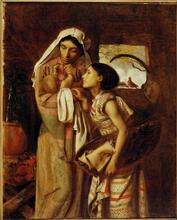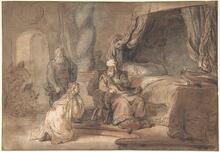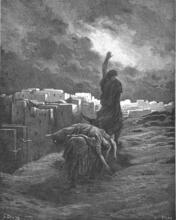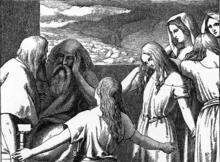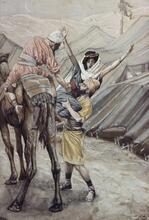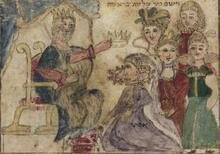Elisheba, daughter of Amminadab: Midrash and Aggadah
Article
Elisheba is mentioned only a single time in the Torah she-bi-khetav: Lit. "the written Torah." The Bible; the Pentateuch; Tanakh (the Pentateuch, Prophets and Hagiographia)Torah (Ex. 6:23), as the daughter of Amminadab, the sister of Nahshon and the wife of Aaron the High Priest. The Rabbis speak at large concerning her. They note her importance, since her life was bound up with the most distinguished families in Israel: her husband was appointed High Priest, her children were deputy high priests, her brother was nasi (chieftain) of the tribe of Judah and her brother-in-law Moses led the Israelites. The A type of non-halakhic literary activitiy of the Rabbis for interpreting non-legal material according to special principles of interpretation (hermeneutical rules).midrash accordingly applies to Elisheba the verse “And may your house be like the house of Perez whom Tamar bore to Judah” (Ruth 4:12), which was meant to signify that Elisheba, too, was descended from the royal line since she was from the tribe of Judah (Ruth Zuta 4:12). Commenting on Jacob’s blessing to Judah, “You, O Judah, your brothers shall praise” (Gen. 49:8), the Rabbis list Elisheba daughter of Amminadab among the important people and officials that were born to this tribe and call her “the mother of the priesthood” (Gen. Rabbah 97:8).
Elisheba’s genealogy in the Torah mentions her not only as the daughter of Amminadab, but also as the sister of Nahshon, a nasi of the tribe of Judah. The Rabbis construed from this that a person who wishes to marry a woman must also inquire about the character of her brothers; they add that most children resemble their maternal uncles (BT Bava Batra 110a).
Elisheba experienced great joy on the day of the Tabernacle’s dedication, as the midrash explains: “Elisheba had five joys more than other Israelite women: her brother-in-law [Moses] was king, her husband [Aaron] was High Priest, her sons [Nadab and Abihu, Eleazar and Ithamar] were deputy high priests, her grandson [Phinehas] was anointed for battle and her brother [Nahshon] was the chieftain of his tribe.” Her great joy, unfortunately, was turned to mourning, for on that very same day two of her sons (Nadab and Abihu) died when they sought to offer alien fire and were consequently consumed by fire. The Divine Justice laughed bitterly at this, as is stated in Eccl. 2:2: “Of revelry I said: ‘It is mad!’,” for man’s joy in this world is not complete, and is always mixed (mahul) with sadness (BT Zevahim 102a; Lev. Rabbah 20:2).
The Rabbis identify Elisheba as one of the Hebrew midwives in Egypt, an identification apparently based on the end of the Biblical account. The midwives disobeyed Pharaoh’s decrees and did not kill the boys, which the Torah (Ex. 1:21) attributes to their fear of God, for which they were rewarded by the Holy One, blessed be He, who “established households for them.” The Rabbis understand this as priestly, Levite and royal families, in turn leading them to conclude that the midwives were prominent women, who were connected with the leadership of the generation that went forth from Egypt, along with the priests and Levites. This explains one identification of Shiphrah and Puah with Jochebed and her daughter-in-law Elisheba, since the latter had married into the tribe of Levi and the priesthood, and she herself was descended from the tribe of Judah (BT Suspected adulteressSotah 11b). For additional identifications of the Hebrew midwives, see the entries: “Shiphrah” and “Puah.” For the Rabbinic portrayal of Jochebed, see “Jochebed Daughter of Levi.”


